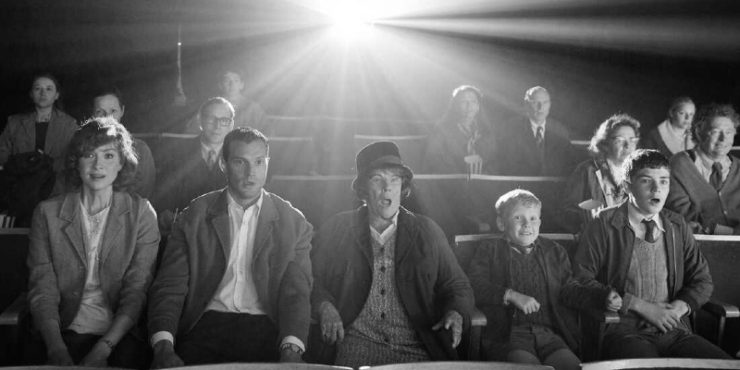Every major director reaches an age where they make their autobiographical film. Good or bad, I’m often weary of anyone’s ability to withstand their own nostalgia. Belfast – an amusing but broad black & white movie about a young boy coming of age in Northern Ireland during the onset of The Troubles – is Kenneth Branagh’s submission. The Shakespearean actor whose more recent directorial efforts were of the bloated studio variety (Marvel’s Thor, Disney’s Cinderella, a hilariously overwrought adaptation of Agatha Christie’s Murder on the Orient Express) takes a step back here, with a compact tale that takes place mostly in a single city block. There’s a young boy named Buddy (a perfectly charming Jude Hill in his first role), who in his own small way is about to learn a lot about the world.
Buddy’s Pa (Jamie Dornan) is a joiner whose work resides across the pond in England. His Ma (Caitríona Balfe) takes care of him and his older brother on her own. A Protestant family in a majority Catholic town, Buddy and his family are often caught amongst skirmishes between the hateful loyalists who want Catholics run out of Northern Ireland. His father begins getting pressure to choose sides (Colin Morgan plays the film’s most visible figure of violent anti-Catholicism). When the pressure turns into threats, Pa tries to convince the family that it’s time to leave Belfast and the violence behind.
The move is a sore subject at home. Will they really be accepted in England where their culture (and their accents) will single them out for alienation? For Buddy, there are personal matters, namely his grandparents (Ciarán Hinds and Judi Dench who give your standard supporting comic relief and occasional wisdom) whom he adores and a young girl in his class that he has a crush on. The arc of Belfast is the slow disintegration of Buddy’s innocence as he learns the harsh truth of his beloved home. Based on his own childhood, Branagh gives Buddy’s journey some poignancy, but his dogged commitment to straining out any sentimentality leaves Belfast a bit dull for large chunks of the story.
The black & white photography (cinematography by Haris Zambarioukos) is handsome throughout, if soulless. A soundtrack constantly pumping Van Morrison (late era that would have been released many years after the events of the film) sets a tone in a superficial way, and despite a good effort from the young Hill, Branagh fails to build a compelling story for the film’s first hour (which is a particular issue since the film is only 97 minutes long). The third act is the only one that delivers on Belfast‘s reputation as a rousing crowd pleaser. The long-overdue stakes are felt and the finality of Buddy’s childhood comes across beautifully. It’s obvious that this is all deadly important to Branagh, but as I always fear, he falls victim to his own wistful reminiscences. If only we could all share in it as well.
Written and Directed by Kenneth Branagh










